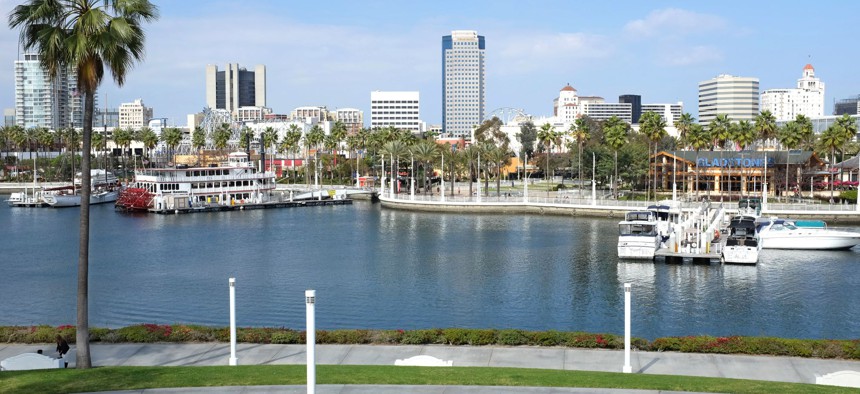In the ‘New Un-Normal’ of Trump, Cities Will Continue to Be Beacons of Progress

Long Beach, California Shutterstock

Connecting state and local government leaders
Long Beach Mayor Robert Garcia discusses how a new White House administration won’t stop the momentum that’s pushed his city and others like it forward.
LONG BEACH, Calif. — Robert Garcia admits that like many big-city mayors, Donald Trump’s presidential victory in November took him by surprise.
“Most urban mayors were expecting Secretary Clinton to win,” the mayor of Long Beach told Route Fifty in an interview last week. A White House led by Hillary Clinton was going to continue the Democratic policies of Barack Obama, policies that saw many U.S. cities, including Long Beach, flourish and prosper.
“We needed that continuation,” Garcia said. “We were excited about that.”
But that continuation didn’t materialize and President Trump, who took office two Fridays ago, and the Republican-controlled Congress have different policies in store for the nation, policies that are in many ways as anti-urban and unfriendly to cities like Garcia’s.
That includes Trump’s strong views on immigration, international trade and health care, plus the real estate mogul’s distorted declarations about urban crime rates.
“We’re in uncharted territory,” Garcia said, “or the new un-normal.”
Long Beach, with a population of nearly 500,000 residents, is a major port city that is often overlooked while living in the shadow of its bigger neighbor, Los Angeles. Long Beach, however, is by no means a simple suburb of the nation’s second-largest city—it’s larger than the cities of Atlanta, Miami and St. Louis.

It’s a growing city in a crowded region and a place with a strong economy, diverse neighborhoods, an attractive beachfront and ample parks and recreational options.
The story of Long Beach’s success in recent years has been one that’s very much similar to other revitalizing large- and medium-size cities and is far from the dark vision of “American carnage” and “inner city” violence that President Trump laid out in his inaugural address.
Despite their political and ideological differences with the new president, big-city mayors can’t simply turn their backs on the new administration in the nation’s capital.
“We’re still interested in working with the federal government on infrastructure,” Garcia said, adding that his colleagues in other city halls are going to stand their ground on issues important to their communities.
“We’re also not just going to stand around and let civil rights get trampled on,” the mayor said.
Among the initial executive orders handed down by President Trump was one that targets “sanctuary cities,” jurisdictions whose leaders have directed their agencies, including law enforcement, to limit their cooperate with federal authorities when it comes to immigration.
Many big-city mayors have spoken out against the order, and it’s an issue that hits home for the mayor, who moved to the United States at age five from Peru and became a U.S. citizen at age 21. Fifteen years later in 2014, then-Councilman Garcia, who is openly gay, was elected mayor.
In a string of tweets issued following Trump’s executive order, Garcia told his family’s story of the American dream and how someone like him could rise to become the mayor of a major U.S. city in what’s been a relatively short life in politics. “Let's stand up for all Americans—including hard working immigrants—because that's what makes my city, and America great,” Garcia wrote.
So what comes next?
Under his administration, Long Beach has come to be recognized as a leader in data-driven governance, transparency and municipal technological innovation. And those efforts are going to continue regardless of which president is in the White House. “That all moves forward,” Garcia said.
Last week, Garcia and other city leaders announced that data-driven law enforcement and community policing would be the focus of the work of the city’s innovation team, funded through the Bloomberg Philanthropies.
With Trump’s administration still very new, it’s hard to predict exactly what the federal role will be in creating a fertile environment that allows tech-driven innovation flourish, Garcia said, but he predicted that many technologists interested in public service are going to see city governments like his as ripe environments to do good work and make an impact.
“Centers of innovation are going to be in our cities,” Garcia said.
Michael Grass is Executive Editor of Government Executive’s Route Fifty and is based in Seattle.

NEXT STORY: Key Findings From 50-State Assessment of Evidence-Based Policymaking





